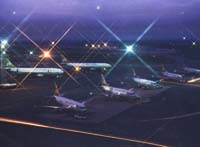|
|
|
|
|
| HOME | BUSINESS | REPORT | |||
|
January 21, 2000
NEWSLINKS
|
Govt paves way for world-class airports in India
Neena Haridas in New Delhi It could mean a ticket to the loo, a premium booze lounge or even a price to use the smoking corner. But it could still be a welcome change for the commuters. Although it will take another one year for the logistics to be in place, the civil aviation ministry has set the ball rolling for airport privatisation. The government's decision to lease out the five airports in Delhi, Bangalore, Madras, Calcutta and Bombay on a long-term basis is among the first in line to make the international airports in India truly 'global'. Civil Aviation Minister Sharad Yadav said, "The idea is to rev up operations, maintenance and efficiency parameters on competitive commercial lines with independent regulation in place." The private companies to which these airports will be leased out will be responsible for "upgrading" them and providing state-of-the-art facilities. The lease is scheduled for a period of 31 years, and will be open for investments from multinationals upto a limit of 74 per cent of the total equity. However, the minister said, "Under special circumstances, foreign investment could be extended to upto 80 per cent to 100 per cent."
It may be recalled the earlier agenda was to corporatise all major airports which meant comprehensive legislative changes along with a clear strategy to get around the umpteen logistical, financial and tax hurdles. Hence, privatisation was adopted as an alternative wherein global bids would be called for leasing the airports which in turn will bring in revenue and world-class expertise. However, privatisation will be carried out in a phased manner. "The Airports Authority of India board has cleared KPMG Peat Marwick as the consultant which will evaluate the five airports. The consultants will be given a time-frame of 12 months to prepare their report on how to go about the privatisation process in three phases," a senior official at the ministry said. Bangalore's will be the first airport to be leased out, which will be followed by the four airports in the metros. Bangalore is being given priority because of the large international traffic that the city attracts because of the huge software industry that has mushroomed there. In the first phase, the airports in Bombay, Delhi, Madras and Calcutta will be evaluated. "Within the evaluation period, the necessary changes required in the AAI statutes will also be made if so required," the official said. The second phase, which begins after the evaluation, will see the actual marketing of the airports to private companies -- both domestic and multinationals through a bidding process. "The request for proposal will be fine-tuned after the international roadshows to attract potential investors are done," said Civil Aviation Secretary Ravindra Gupta. The third and the final phase will be the tendering and selection of the company and negotiations with the bidders. But how does it prove attractive to the private investors? "For the investor, the revenue comes from the facilites that he will be operating at the airports. The main aim of the leasing out is to 'upgrade' the airports. You see, these airports account for over 70 per cent of the total revenue and 68 per cent of the traffic. Hence, it is very important to upgrade them keeping the international traffic in mind. Most of the smaller airports are subsidised by the revenue earned from the metro airports," said Gupta. The AAI's request that the revenue from leasing out the airports should be accrued to them has been accepted by the government. The AAI had demanded that the revenue should go back into the maintenance of airports and not the consolidated fund of the government. However, the airport employee unions are not buying this argument and have reacted very sharply. However, Gupta said, "It is not necessary that privatisation will lead to lay-offs. When the airport is upgraded and facilites are improved and new facilities are created, it would only help in generating more employment and better working conditions." Some of the new facilities that would be made available by private operators, for a price of course, include business centres, restaurants, wash rooms, rooms for transit passengers who want to stay overnight, better lounges, etc. Internationally, some of the top airports of the world such as Singapore's Changi airport and the international airport at Dubai are maintained by private operators and are marketed very aggressively. These airports are learnt to have become major tourist attractions, thanks to their top-of-the-line shops, lotteries with attractive prizes and better facilities for commuters.
|
| Tell us what you think of this report | |
|
HOME |
NEWS |
BUSINESS |
MONEY |
SPORTS |
MOVIES |
CHAT |
INFOTECH |
TRAVEL SINGLES | NEWSLINKS | BOOK SHOP | MUSIC SHOP | GIFT SHOP | HOTEL BOOKINGS AIR/RAIL | WEATHER | MILLENNIUM | BROADBAND | E-CARDS | EDUCATION HOMEPAGES | FREE EMAIL | CONTESTS | FEEDBACK |
|